Popular Reads
Top Results
Can't find what you're looking for?
View all search resultsPopular Reads
Top Results
Can't find what you're looking for?
View all search resultsIndia study suggests millions more may have caught coronavirus
Change text size
Gift Premium Articles
to Anyone
 Migrant workers coming from other states, stand in queue to get a Rapid Antigen Test (RAT) for the COVID-19 coronavirus as they arrived at the Anand Vihar bus terminal to board on city buses, in New Delhi on Wednesday.More than a quarter of New Delhi's 20 million residents may have caught the novel coronavirus without showing symptoms, a study released Thursday indicated, raising fresh doubts about India's official case numbers. (AFP/Prakash SINGH )
Migrant workers coming from other states, stand in queue to get a Rapid Antigen Test (RAT) for the COVID-19 coronavirus as they arrived at the Anand Vihar bus terminal to board on city buses, in New Delhi on Wednesday.More than a quarter of New Delhi's 20 million residents may have caught the novel coronavirus without showing symptoms, a study released Thursday indicated, raising fresh doubts about India's official case numbers. (AFP/Prakash SINGH )
M
ore than a quarter of New Delhi's 20 million residents may have caught the novel coronavirus without showing symptoms, a study released Thursday indicated, raising fresh doubts about India's official case numbers.
Extrapolated, the antibody study on 15,000 residents means 5.8 million people in the bustling capital could have caught the virus -- more than 37 times the official tally of 156,139 infections.
India is already officially the third worst-hit country after the US and Brazil, and the health ministry reported a record daily jump of 69,652 new infections on Wednesday -- taking the total to 2.84 million.
On Thursday, Delhi health minister Satyendra Jain said blood tests on 15,000 residents conducted earlier this month found 29.1 percent of them had virus antibodies.
Scientists say, however, that antibody tests should be treated with caution because they also pick up other coronaviruses, not just the latest COVID-19.
A similar survey in June-July said 23 percent of people tested had been exposed to the virus in the city.
Surveys in other Indian cities have also suggested more infections than the official numbers suggest.
In the western city of Pune, 51.5 percent of respondents in five badly affected pockets had antibodies in their blood, a recent survey showed.
Another in late July found 57 percent of those tested in Mumbai's slums had the infection -- far more than official data suggests.
"Such studies are useful and necessary but it is important how it is interpreted," said Rajib Dasgupta, who heads the Centre of Social Medicine and Community Health at Delhi's Jawaharlal Nehru University.
"It can't be applied to the whole city," he said, noting that the Pune study was done in a very densely populated area of the city.
Another survey released this week, testing sewage water in Hyderabad, estimated that some 6.6 percent of the city of over nine million may have been infected -- also far higher than the official data suggests.









